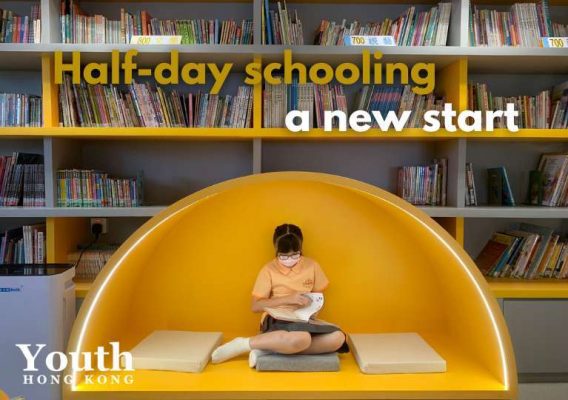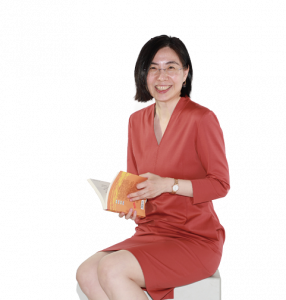//vol.13-3 Insight: primary school
- As the new academic year begins, how are primary schools adapting?
- Dr Tse Wai-lok, principal of the HKFYG Lee Shau Kee Primary School, describes the ongoing challenges.
- Despite hurdles faced by parents, teachers and students, she remains optimistic about the future.
- 隨著新學年開始,本港小學如何應對新常態的種種挑戰?
- 香港青年協會李兆基小學校長謝煒珞博士道出學界所面臨的困境。
- 儘管家長和師生都面對著各種難關,她對未來依然感到樂觀。
Face-to-face classes resumed in September on a half-day basis but manpower issues and problems with online teaching modes remain at the forefront of principals』 minds.“While experience has been gained and the school has made strides in adapting to the world of online learning, significant difficulties remain,” says Dr Tse.
To add to the stress, IT skills have become a foundation stone of teaching so various online communication channels were established early on during the pandemic. “Rules, including login for online classes, roll call, use of cameras and deadlines for handing in homework are essential, but teachers cannot respond immediately to all pupils and they also need to communicate with the parents if there are problems and then follow up,” she points out.
“The older students have been using the school’s self-learning platform for up to five years, including Google Classroom and Google Sites, so the transition was smoother than expected,” Dr Tse explains. “Before class or shortly after, teachers upload videoed lessons and PowerPoint slides with important teaching points and worksheets but the videoed lessons must have high quality, teaching content that is interesting and appropriate.”
Support for challenging times
Apparently, the pressure on teachers has been immense. “Offering support to teachers has been of prime importance,” Dr Tse stresses. “Fortunately, we have foundation training and experience in this field so we have set up a lot of workshops to equip teachers with the latest IT skills and have been able to hire three more teachers.” If there are problems in the implementation of online learning, there is also a team of ICT teachers on hand to offer help immediately, with both software and hardware.
Some of the school’s teachers act out stories for students in order to stimulate their interest in learning at home. Although it takes a lot of time, teachers find it worthwhile. Creating online assignments is another technical task that teachers need to face every day. “Although all this ‘virtual’ work takes up quite a lot of time, it provides a good opportunity for the school to reflect and explore how e-learning can be integrated in the future,” Dr Tse remarks.
A good opportunity to reflect and explore how e-learning can be integrated in the future.
Learning with online timetables
For those entering Primary One, an “Adaptation Month” was arranged in September, with foundation courses that included phonics and pinyin. “Group games, singing songs and life education allow students to integrate into school life while teachers observe their language abilities before formally dividing them into different classes a month after the start of term.”
During the pandemic, Zoom meetings of teachers and students provided a chance to practise language while parents sat beside them at home. “They could easily understand how learning took place and sometimes offered a lot of help which was conducive to learning.” However, the extensive use of Zoom created its own problems. “The students are young and eye development is crucial, but long-term, continuous use of Zoom will affect their health so the daily limit is set at two hours. The school, thus, created a unique timetable with learning tasks such as reading aloud, reading books independently and sports. These key daily elements guide students into setting up a regular routine for learning.”
Long-term, continuous use of Zoom will affect health so the daily limit is two hours.
Although young children can’t be left to study alone, the school advocates the importance of cultivating self-discipline. “Fortunately, because the school was already practising self-directed learning, most students were quite ready for the change,” Dr Tse continues. Nonetheless, they encountered three new challenges: the suitability of their home environment for learning, the availability of computer equipment at home, and their attitude while having lessons at home with parents as supervisors.

Cooperating with parents
School-parent cooperation will be very important during the coming academic year if students are to settle into school life easily. “The most recent training courses we offered focus on parent education,” Dr Tse explains, noting that parents spent a lot of time with their children during class suspensions. Many were working at home under pressure, so friction was probably inevitable.
It was no wonder, in the circumstances, that some parents asked the school for help if they worried about their children’s learning attitudes. “Indeed, communication with parents became very important,” Dr Tse says. “The school always uses an electronic communication system to allow parents and teachers to contact each other whenever necessary. This makes it easy for the school to know how many families need support to cope with online lessons and whether their children are in need of further help.” There are established policies for borrowing computer hardware and software, though few students apply. “Students are familiar with using electronic equipment for classes and we expect them to buy their own devices. However, the problem that persistently affects the quality of classes is network instability,” she notes.
“We believe parents must have patience and wisdom, communicating with their children in a suitable way, rather than scolding blindly or nagging,” Dr Tse says. Positive, flexible parent-child relationships are more important than ever. “With so much time spent on computers, the students are easily exposed to inappropriate content on the internet,” Dr Tse points out. “Curiosity is natural so this is a good chance to discuss internet content rationally. Education is available everywhere in life and parents must seize the opportunity.”
The way forward
For the school, the biggest challenge is planning. “Whenever we have to make a decision, we need to formulate two plans, not just one,” Dr Tse points out. She always thinks ahead and the underlying concern is a sudden suspension of classes. “We have our original plan for face-to-face schooling but at the same time, we need to prepare a back-up plan so that the school can handle sudden changes more efficiently.”
The past two years have brought tremendous changes to the school, teachers, parents and students alike, but Dr Tse is optimistic. “We still stay positive and explore how these changes in learning can benefit our students in the future.” ![]()
For information about the HKFYG Lee Shau Kee Primary School, go to



